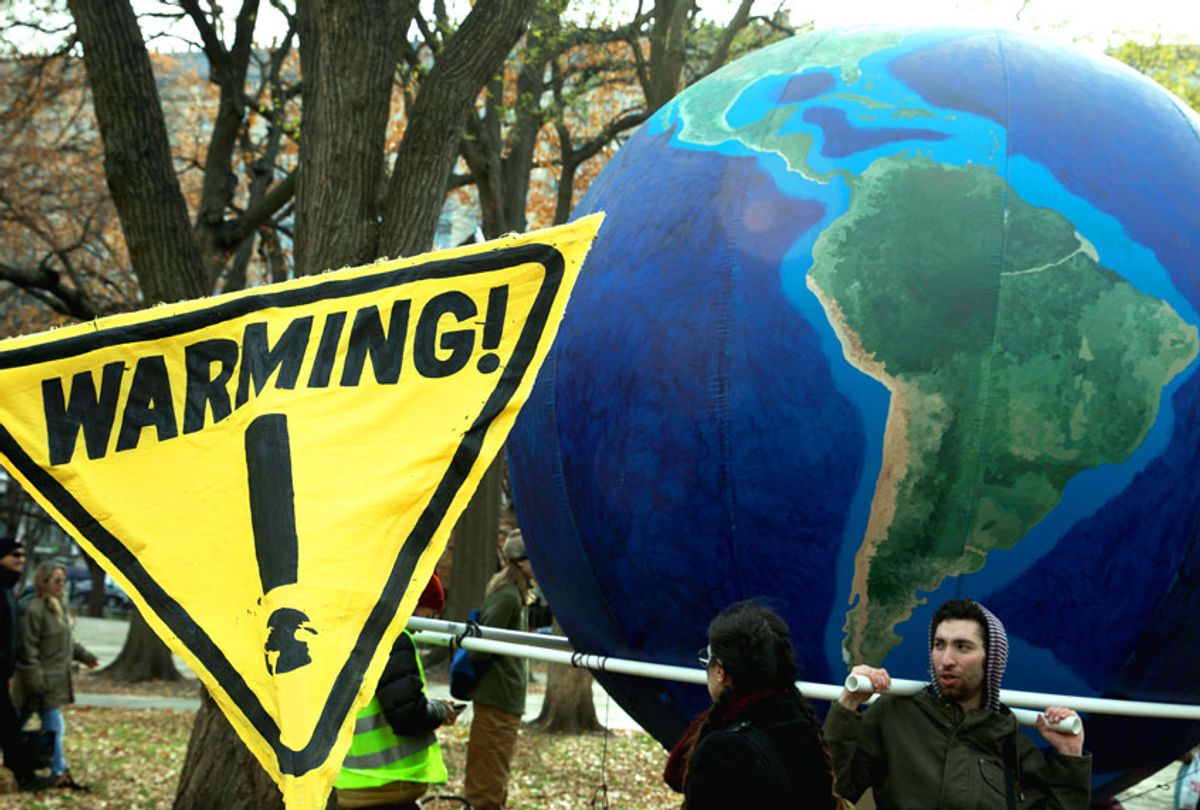At a Thursday night rally for Elizabeth Warren in Derry, New Hampshire, there was much the Massachusetts senator had to say that drew cheers from the crowd. They liked her progressive positions on health care and the economy, and applauded when she attacked corruption in D.C. politics. But one issue drew an even more impassioned response from the crowd than most: Moose.
That is, what climate change was doing to moose, more specifically. A woman got up and asked Warren about climate change, which she said was affecting the "iconic moose population" of New Hampshire.
Correctly ascertaining that this was about more than moose, Warren turned to the crowd and said that climate change "threatens every living thing on this planet" and that every time the scientists do new calculations, it turns out "worse than we thought and we had less time than we thought."
Then, in typical Warren fashion, she ran down the long list of things she planned to do, both through executive actions like halting oil and gas drilling on federal lands and empowering the EPA to do its job. She also trumpeted the Green New Deal and argued that the U.S. government must inves more in scientific research to slow down the problem and clean up the planet.
The crowd went nuts for this, cheering more than they had for nearly anything else Warren said. Turns out that climate change is an issue that's weighing heavily on the minds of Democratic voters here, yet somehow it's not an issue that gets much attention in the media coverage of the Democratic primary race.
The moderators of the ABC News Democratic debate in New Hampshire on Friday night continued to be recalcitrant, although they teed up the usual tired fight about health care early on, and forced candidates like Tom Steyer and Sen. Bernie Sanders to shoehorn the topic into a foreign policy discussion. The first climate-related question was only introduced at the top of the third hour, and even then, it was framed in a hostile fashion, assuming that fighting climate change is the enemy of a robust economy.
ON Friday, before the debate, despite the absolutely miserable weather — freezing rain and sleet that defied even the most waterproof boots (I discovered the trick of blow-drying my feet when I returned) — protesters from the activist group 350 New Hampshire and other local organizations gathered in downtown Manchester to demand that the debate moderators ask about climate change. Many more people had initially planned to come, organizers said, bu but were literally frozen inside their homes and unable to get out safely.
Still, a few dozen people made it, and a few even wore their costumes, showing a stalwart Yankee indifference to weather so dire it nearly broke my spirit. But this wasn't a typical protest, as the average age of attendees — as happens these days with climate protests — skewed young.
"Everything else relies on a stable Earth," Lilly Tague-Bleau, 15, told me.
"We can talk about Medicare and immigration and all these rights," she added, "but without an earth that we can live on without worrying about our survival, we have nothing."
Two young men who traveled together from Massachusetts and Connecticut to support Sanders in the Democratic primary also came out to the protest.
"We've all watched the debates," said Kyle Burzycki, 19. "It's embarrassing how little they're talking about it, seeing as it's the most important issue facing our country."
His friend, Christian Bevilacqua, 18, concurred, adding, "It's really one of those issues that connects to everything. It's affecting everyone where they live, their energy consumption, that they're having pollution, the animals. It's affecting the way we're eating."
For the brief period of time I was able to withstand the freezing rain with these folks, it was impressive how much engagement they were making with passers-by in their cars. There was constant honking in approval and multiple people pulling over to take pictures or ask protesters questions about their activism. It might be just the way things are in New Hampshire — there's a lot of self-consciousness about being politically engaged in this state — but it also speaks to the importance of the issue.
A spokeswoman for 350 New Hampshire, Lila Kohrman-Glaser, 26, caught up with me as I wandered through the crowd and told me that the fight against climate change is a local one here in New Hampshire, due to the ongoing struggle over a coal-fueled power plant in the nearby town of Bow. Protesters have been targeting the plant in hopes of shutting it down. Kohrman-Glaser said she was arrested in September at just such a protest.
"I don't consider myself a troublemaker or a rule-breaker," she said. "I took action at that power plant out of absolute, utter desperation, because for every hour that that plant turns on, it emits as much carbon dioxide as I've admitted in my entire 26 years of life."
Kohrman-Glaser told me young people are fed up with being told that climate change is a matter of individual consumption habits, because no matter how much people curtail their energy use, it's a drop in the bucket compared to industrial use.
"It's going to take a World War II-era style mobilization at every level of our government," she said, pointing to her group's scorecards of candidates indicating their level of support for this action. (Unsurprisingly, Warren and Sanders score best.)
This echoed Warren's comments at the Derry event. Three industries, she said, "produce 70% of our carbon output in the United States." With regulations on cars, new home building, and the power industry, she believes we can go "a long way toward zero-carbon emissions".
The crowd cheered wildly for this. People care about this issue, a lot — in this small state and everywhere else. But will the media covering the presidential race ever even notice, or reflect that?



Shares